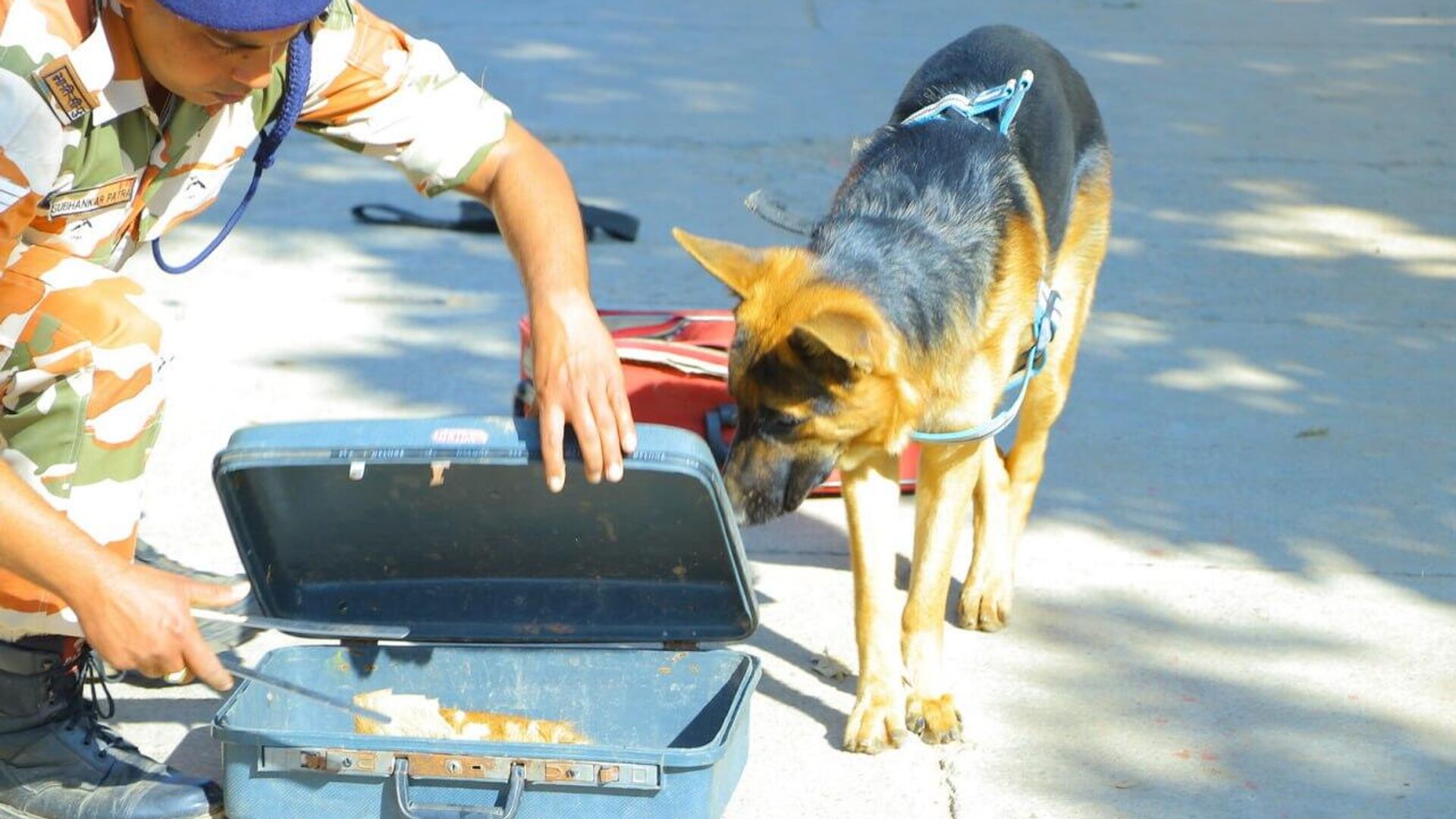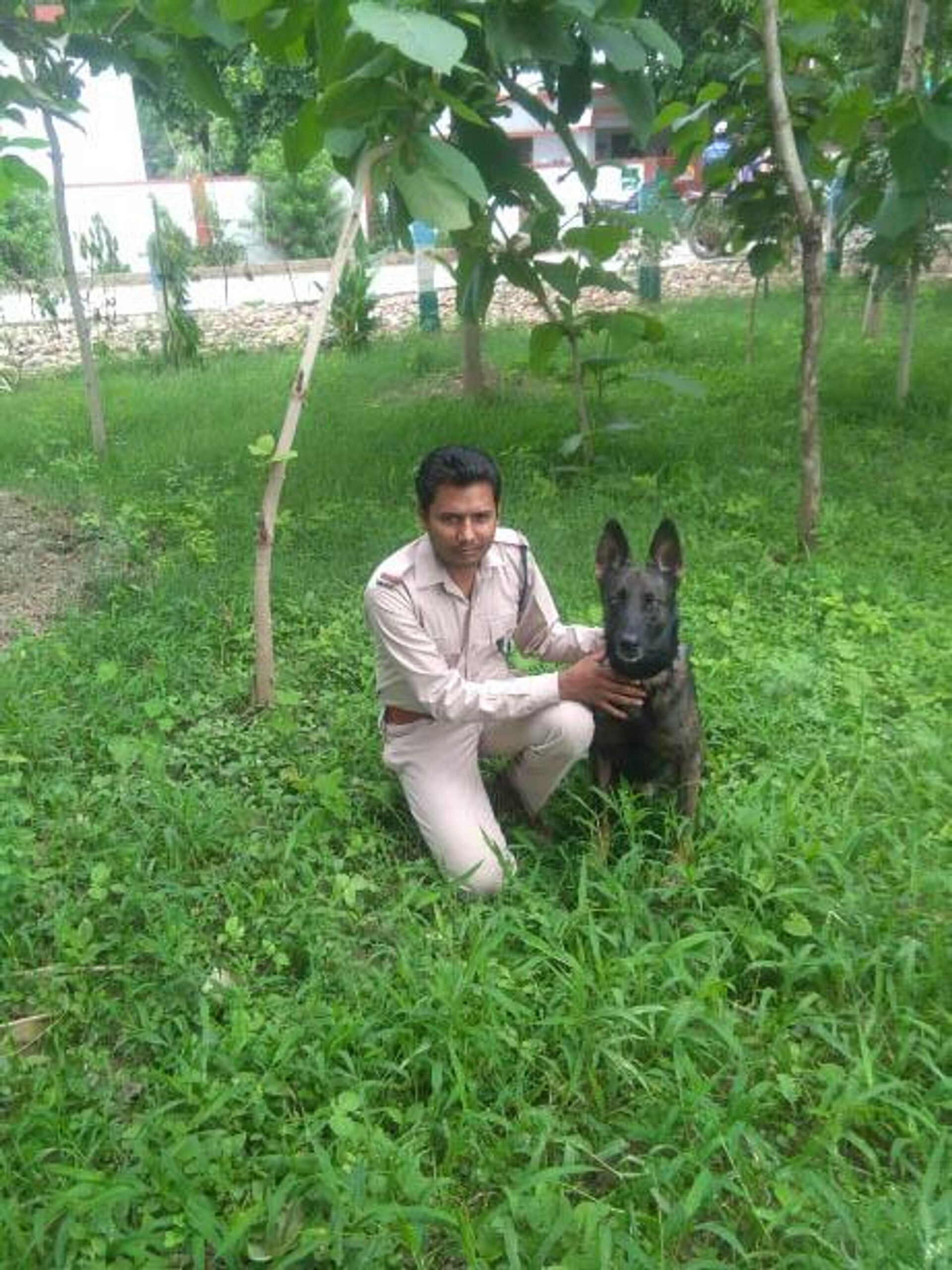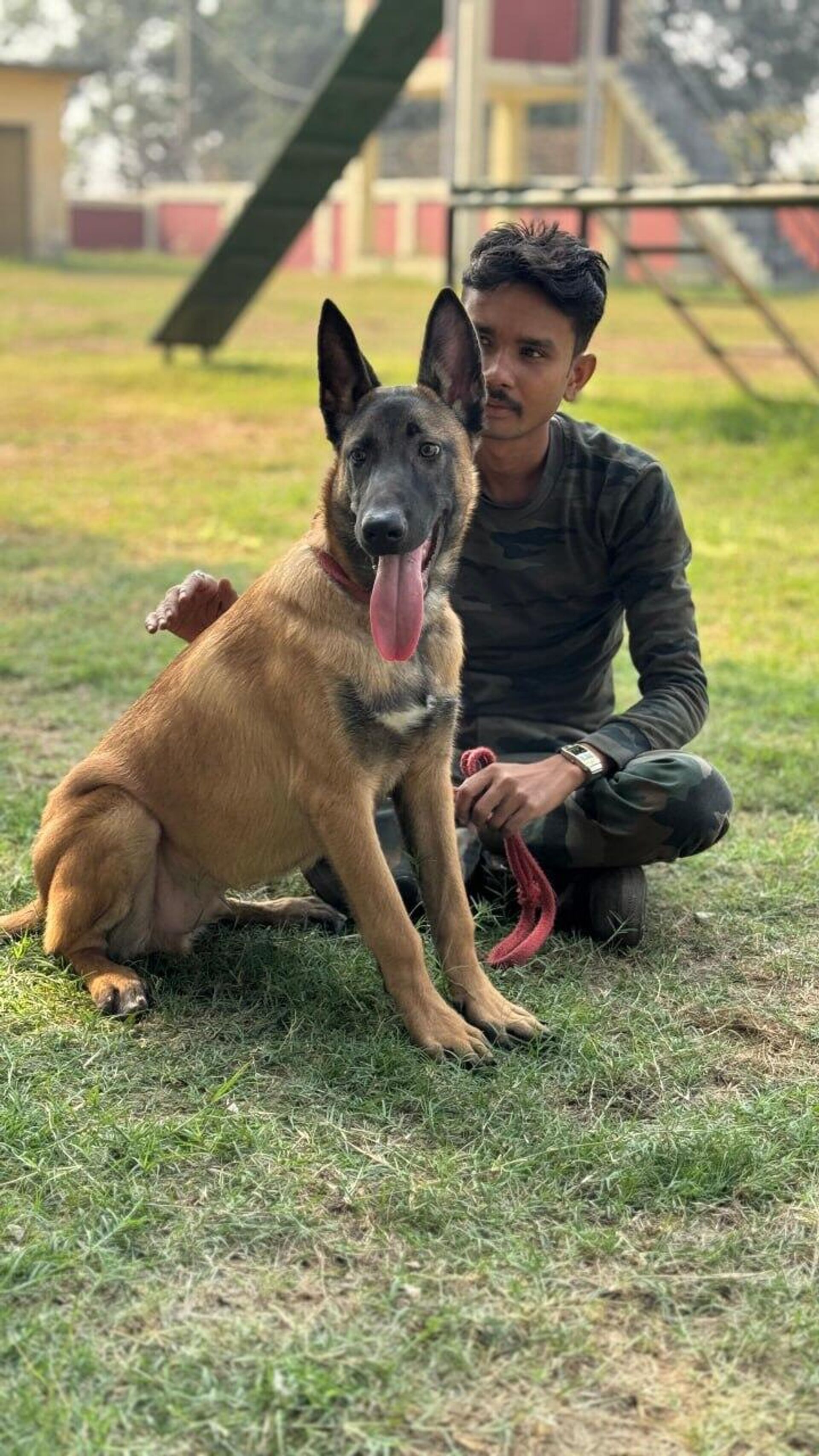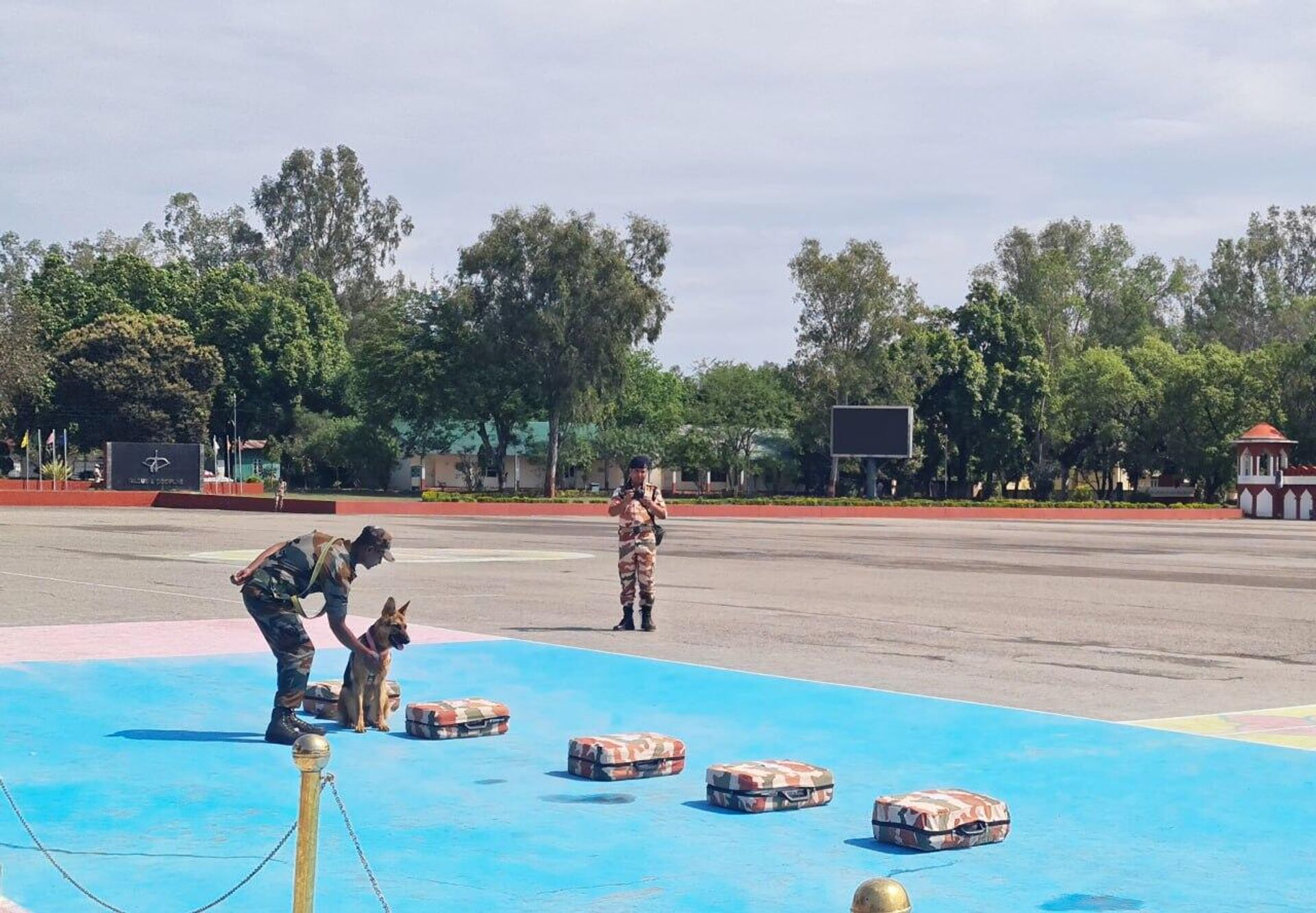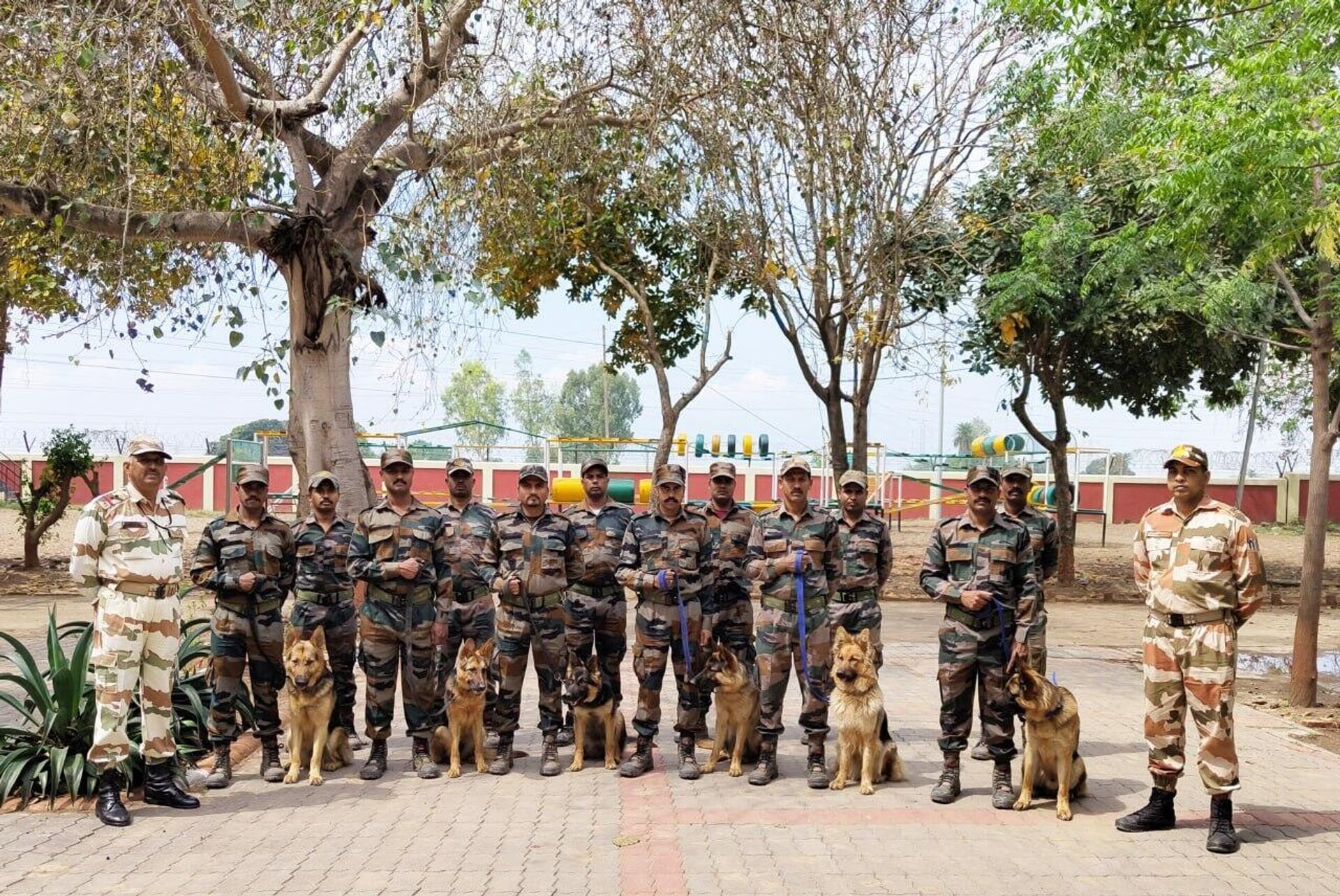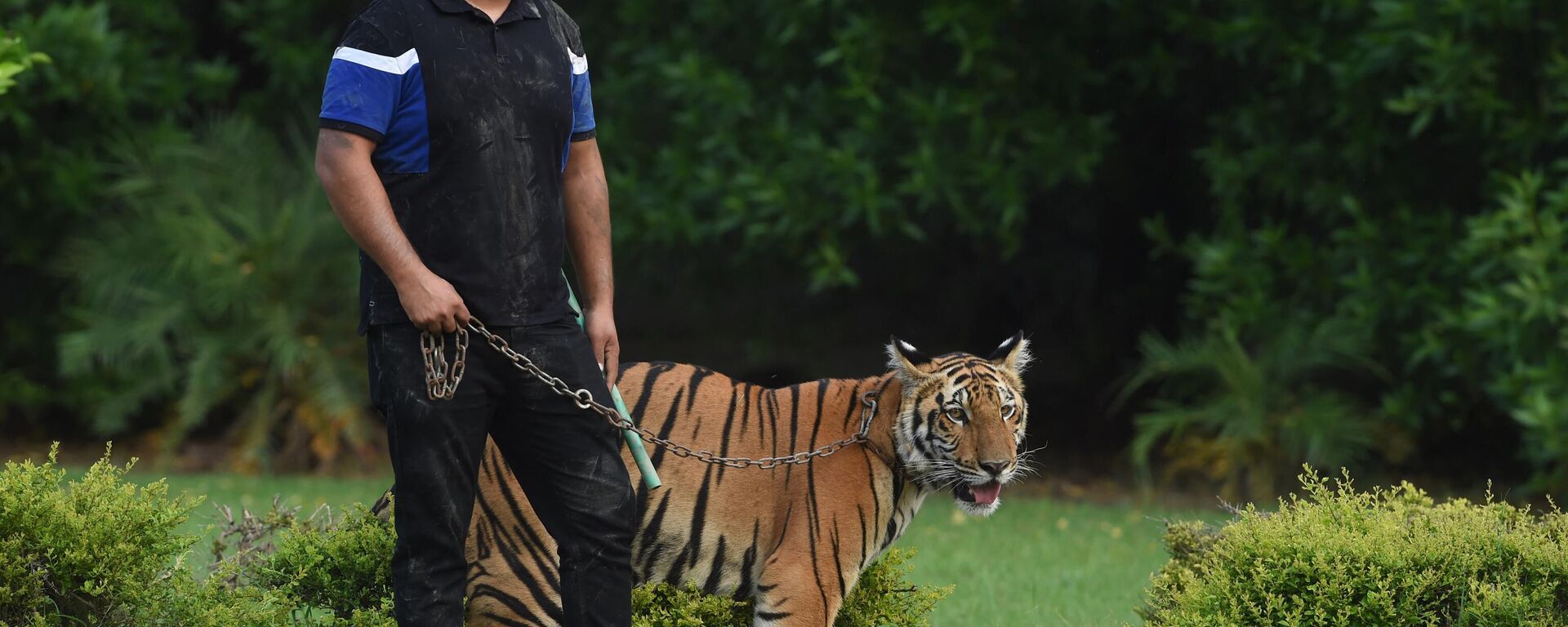https://sputniknews.in/20231128/super-sniffers-dog-squad-leading-fight-against-crime-in-india-5597947.html
'Super Sniffers' Dog Squad Leading Fight Against Crime in India
'Super Sniffers' Dog Squad Leading Fight Against Crime in India
Sputnik India
Fondly called 'Super Sniffers', the Wildlife Sniffer Dog Squads have turned out to be the canine heroes who have been helping police in detecting drugs, explosives, trafficking of animal parts and their illegal trade.
2023-11-28T17:27+0530
2023-11-28T17:27+0530
2023-11-29T11:02+0530
sputnik exclusives
india
animal testing
animal rights
animal extinction
sacred animal
border security force (bsf)
haryana
madhya pradesh
wildlife
https://cdn1.img.sputniknews.in/img/07e7/0b/1b/5596904_0:67:1280:787_1920x0_80_0_0_8dfd6cbcc95f0f66409815bdf6495e34.jpg
With their cute puppy faces and endearing gestures, these furry, four-legged creatures have the power to melt anyone's heart. However, their intelligence goes far beyond their adorable appearance.The remarkable super sniffers of the Wildlife Dog Squad possess extraordinary prowess for detecting wildlife crime. They are not only adept at uncovering illegal trade and smuggling of animal parts but also play a crucial role in detecting drugs, explosives and contrabands. Meet seven-year-old wildlife super sniffer Nirman, a German Shepherd who was honoured with 'Canines for Felines' award for curbing tiger poaching during his deployment at Tiger Strike Force since 2016 in Madhya Pradesh state's Satna Division.Nirman, along with his handlers, Rajkishor Prajapati and Ashok Kumar Gupta, have assisted in solving over 80 wildlife crime-related cases targeting species such as tiger, leopard, bear, four-horned antelope (tetracerus quadricornis), chital, sambar, wild boar, and nilgai, and has also helped recover hunting tools such as snares and wires for electrocution.Nirman is not the only super sniffer. There are plenty of super sniffer dogs undergoing rigorous training with Border Security Force (BSF) and WWF-Traffic India and have been deployed for patrolling, explosives & narcotics detection, search and rescue dog training, poison detection training and vigil duties.Dr. Dipankar Ghose, senior director, Biodiversity Conservation, WWF-India and the interim head of TRAFFIC’s India Office, told Sputnik India that using wildlife sniffer dogs for deterring and detecting crimes has been a game changer in India as it has played a big role in assisting law enforcement agencies in apprehending criminals.Rise in Wildlife CrimeThe illicit trade of wildlife is a severe global issue, ranking as the fourth largest organized criminal activity estimated to be $7 to $23 billion per year. This illegal trade poses a significant threat to the survival of numerous wildlife species.In India, poaching for the illicit wildlife trade is alarmingly widespread in certain areas, posing a severe threat to the targeted wildlife and its very existence.The list continues with the smuggling of elephant tusks, deer antlers, shahtoosh (wool obtained from the fur of the wild antelope 'chiru'), turtle shells, musk pods, bear bile, precious medicinal plants, timber, and even caged birds like parakeets, mynas, munias, and other precious species.Formation of Wildlife Sniffer Dog Squads in IndiaTo detect and prevent wildlife crime in India, the wildlife sniffer dog programme was launched with just two dogs in 2008.So far, 94 wildlife sniffer dogs have been trained and deployed across the country.Last week, TRAFFIC and WWF-India's remarkable wildlife sniffer dog squads reached a significant milestone by recruiting 11 additional young dogs of the Belgian Malinois breed for training, bringing the grand total to 105 dogs.Training Programme of Wildlife Sniffer DogThe hiring of sniffer dogs, specifically German Shepherds, Belgian Malinois and Labradors, takes place at a very early age. Each sniffer dog gets two handlers who undergo rigorous training together under TRAFFIC’s programme.The wildlife sniffer dog training programme is divided into two phases. The initial stage emphasizes the development of a strong emotional and trustworthy connection between the dog and the handler. It is followed by basic obedience training.During the second phase, the dogs undergo training to acquire skills in sniffing and tracking. They are specifically trained to detect illicit wildlife products such as tiger and leopard skins, bones, bear bile, red sanders, and various other body parts.After completing their eight months of training, these exceptional sniffers, together with their skilled handlers, are deployed to protect forested areas in 22 states and Union Territories.The wildlife sniffer dogs are primarily deployed by the Forest Departments and the Railways Protection Force (RPF) across the country.
https://sputniknews.in/20230219/pakistans-elite-keeping-exotic-wild-animals-to-display-wealth-930748.html
india
haryana
madhya pradesh
Sputnik India
feedback.hindi@sputniknews.com
+74956456601
MIA „Rossiya Segodnya“
2023
Sangeeta Yadav
https://cdn1.img.sputniknews.in/img/07e6/0c/0f/110602_0:0:641:640_100x100_80_0_0_c298016a79eb02ef8caa9d1f688c12a5.jpg
Sangeeta Yadav
https://cdn1.img.sputniknews.in/img/07e6/0c/0f/110602_0:0:641:640_100x100_80_0_0_c298016a79eb02ef8caa9d1f688c12a5.jpg
News
en_IN
Sputnik India
feedback.hindi@sputniknews.com
+74956456601
MIA „Rossiya Segodnya“
Super Sniffers
Sputnik India
Super Sniffers
2023-11-28T17:27+0530
true
PT0M40S
Sputnik India
feedback.hindi@sputniknews.com
+74956456601
MIA „Rossiya Segodnya“
Sangeeta Yadav
https://cdn1.img.sputniknews.in/img/07e6/0c/0f/110602_0:0:641:640_100x100_80_0_0_c298016a79eb02ef8caa9d1f688c12a5.jpg
super sniffers, wildlife sniffer dog squads, canine heroes, forest police officers, detecting drugs, explosives, trafficking of animal parts, illegal trade, four-legged creatures, detecting wildlife crime, uncovering illegal trade and smuggling of animal parts, contrabands, german shepherd, canines for felines award, tiger poaching, tiger strike force, madhya pradesh, handlers, rajkishor prajapati and ashok kumar gupta, leopard, bear, four-horned antelope, chital, sambar, wild boar, nilgai, hunting tools, snares, wires for electrocution, border security force (bsf), wwf- traffic india, patrolling, explosives detection, narcotics detection, search and rescue dog training, poison detection training, vigil duties, dr. dipankar ghose, biodiversity conservation, wwf-india, head of traffic’s india office, law enforcement agencies, apprehending wildlife criminals, wwf india, traffic,
super sniffers, wildlife sniffer dog squads, canine heroes, forest police officers, detecting drugs, explosives, trafficking of animal parts, illegal trade, four-legged creatures, detecting wildlife crime, uncovering illegal trade and smuggling of animal parts, contrabands, german shepherd, canines for felines award, tiger poaching, tiger strike force, madhya pradesh, handlers, rajkishor prajapati and ashok kumar gupta, leopard, bear, four-horned antelope, chital, sambar, wild boar, nilgai, hunting tools, snares, wires for electrocution, border security force (bsf), wwf- traffic india, patrolling, explosives detection, narcotics detection, search and rescue dog training, poison detection training, vigil duties, dr. dipankar ghose, biodiversity conservation, wwf-india, head of traffic’s india office, law enforcement agencies, apprehending wildlife criminals, wwf india, traffic,
'Super Sniffers' Dog Squad Leading Fight Against Crime in India
17:27 28.11.2023 (Updated: 11:02 29.11.2023) Fondly called 'Super Sniffers', the Wildlife Sniffer Dog Squads have turned out to be the canine heroes who have been helping police to detect drugs, explosives, trafficking, and the illegal trade of animals and their various body parts.
With their cute puppy faces and endearing gestures, these furry, four-legged creatures have the power to melt anyone's heart. However, their intelligence goes far beyond their adorable appearance.
The remarkable super sniffers of the Wildlife Dog Squad possess extraordinary prowess for detecting wildlife crime. They are not only adept at uncovering illegal trade and
smuggling of animal parts but also play a crucial role in detecting drugs, explosives and contrabands.
Meet seven-year-old wildlife super sniffer Nirman, a German Shepherd who was honoured with 'Canines for Felines' award for curbing tiger poaching during his deployment at Tiger Strike Force since 2016 in Madhya Pradesh state's Satna Division.
Nirman, along with his handlers, Rajkishor Prajapati and Ashok Kumar Gupta, have assisted in solving over 80
wildlife crime-related cases targeting species such as tiger, leopard, bear, four-horned antelope (tetracerus quadricornis), chital, sambar, wild boar, and nilgai, and has also helped recover hunting tools such as snares and wires for electrocution.
Nirman is not the only super sniffer. There are plenty of super sniffer dogs undergoing rigorous training with
Border Security Force (BSF) and WWF-Traffic India and have been deployed for patrolling, explosives & narcotics detection, search and rescue dog training, poison detection training and vigil duties.
Dr. Dipankar Ghose, senior director, Biodiversity Conservation, WWF-India and the interim head of TRAFFIC’s India Office, told Sputnik India that using wildlife sniffer dogs for deterring and detecting crimes has been a game changer in India as it has played a big role in assisting law
enforcement agencies in apprehending criminals.
"These super sniffers have shown tremendous potential in seizing wildlife products, nabbing poachers and acting as strong deterrents to wildlife crime in India," Dr Ghose said.
The illicit trade of wildlife is a severe global issue, ranking as the fourth largest organized
criminal activity estimated to be $7 to $23 billion per year.
Scores of rare, endangered and exotic animals and plants are traded for food, medicine, clothing, furniture and musical instruments, making it a big illegal business.
This illegal trade poses a significant threat to the survival of numerous wildlife species.
In India, poaching for the illicit wildlife trade is alarmingly widespread in certain areas, posing a severe threat to the targeted wildlife and its very existence.
This illicit trade ranges from mongoose hair and snake skins to the highly sought-after rhino horn and tiger and leopard body parts such as claws, bones, skins, and even whiskers.
The list continues with the smuggling of elephant tusks, deer antlers, shahtoosh (wool obtained from the fur of the wild antelope 'chiru'), turtle shells, musk pods, bear bile, precious medicinal plants, timber, and even caged birds like parakeets, mynas, munias, and other precious species.
"The dogs are trained to detect bone and skin of tigers and leopards, elephant tusk, bear bile, deer antlers and plant products like red sanders and caterpillar fungus. In the field, these dogs have adapted their sniffing skills to detect an array of additional wildlife parts and derivatives, including deer meat, live birds, snakes, porcupines, turtles, tortoises and marine products," Dr Ghose said.
Formation of Wildlife Sniffer Dog Squads in India
To detect and prevent wildlife crime in India, the wildlife sniffer dog programme was launched with just two dogs in 2008.
So far, 94 wildlife sniffer dogs have been trained and deployed across the country.
Last week, TRAFFIC and WWF-India's remarkable wildlife sniffer dog squads reached a significant milestone by recruiting 11 additional young dogs of the Belgian Malinois breed for training, bringing the grand total to 105 dogs.
Training Programme of Wildlife Sniffer Dog
The hiring of sniffer dogs, specifically German Shepherds, Belgian Malinois and Labradors, takes place at a very early age. Each sniffer dog gets two handlers who undergo
rigorous training together under TRAFFIC’s programme.
The wildlife sniffer dog training programme is divided into two phases. The initial stage emphasizes the development of a strong emotional and trustworthy connection between the dog and the handler. It is followed by basic obedience training.
During the second phase, the dogs undergo training to acquire skills in sniffing and tracking. They are specifically trained to detect illicit
wildlife products such as tiger and leopard skins, bones, bear bile, red sanders, and various other body parts.
"Over time, we have shared our insights and experiences from the programme with our international offices in various countries. Our vision is to expand this further to include the tools and technology used by other countries while training and using wildlife sniffer dogs," Dr Ghose said.
The training of the wildlife sniffer dogs takes place at three centres - National Training Centre for Dog (NTCD), BSF Academy in Madhya Pradesh's Gwalior; 23rd Battalion Special Armed Force Police Dog Training Centre in Madhya Pradesh's Bhopal city; and Basic Training Centre, Indo-Tibetan Border Police Force (BTC-ITBP) in Panchkula city in Haryana.
After completing their eight months of training, these exceptional sniffers, together with their skilled handlers, are deployed to protect forested areas in 22 states and Union Territories.
The wildlife sniffer dogs are primarily deployed by the Forest Departments and the Railways Protection Force (RPF) across the country.
"The programme also aims to include more wildlife law enforcement agencies, such as Customs and Police, involved in countering wildlife trafficking and illegal wildlife trade. We also hope this training programme is institutionalised within the government framework, just like training other detector dogs for crime prevention," Dr Ghose signed off.
